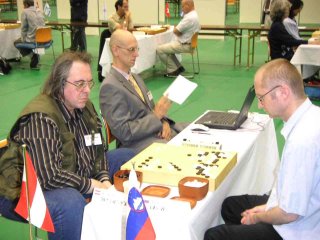
In the 6th round of the tournament I found myself at the same table
with Spiegl and Slovenia's Leon Matoh. When the representative from
Austria won the nigiri and got to play the black stones, I moved over
to his side of the table instead remaining where I was and "flipping"
the game board on the screen of my laptop. (In accordance to the strict
instructions by the ki-in people).
When the laptop and I were settled Matoh and Spiegl could start their
game, and what a game it was.
Before having a look at that 3-hour battle in which Matoh at one moment
seemed to have seven (7!) groups on the board, I'd like to present you
the Spiegl interview first.
"But Pieter, how do you know if what I tell you is all true? I could be
making up every single word for all you know!"
"Well Mr. Spiegl, I want to be trusted (much easier that way to get
writing work, any work) and when you go over the article I did on you
and see that I truthfully put down what you told me you know that I can
be trusted. That you will never forget, isn't that worth something?"
Laughing Spiegl continued talking, he is a big man and when asked about
his weight he didn't mind at all.
"I'm about 140 kilo at the moment; I've been told that is more or less
the same weight of the Sumo Champion Yokozuna." The first foreign-born
Yokozuna Akebona weighs in at over 200 kilograms so Spiegl is not quite
there yet.
"I started with go at age 23, quite late come to think of it. At
that time what was I doing, I studied so many things I don't exactly
remember, I think it was music theory. For a while I have been a
composer, you know before I started doing my current line of work."
At the moment Spiegl is a private investigator, work he is not
particularly fond of but when asked about it he explained. "This work is
not that attractive but it pays the bills and since it doesn't take up
so much of my time I can spend plenty time on go, and that is what it is
all about."
Although Spiegl does not like to compete in tournaments so much anymore
he loves putting time and energy in go. "Just now I'm busy going through
the complete works of Go Seigen for the second time, currently I'm in
book two. Of course I put every game on my fancy board wouldn't dream of
just clicking through it on a computer.
"Anyway, at 23 I started with go and went to the Vienna go club for the
first time. I had seen some pamphlets or such at the university and
those had peaked my interest. Actually, I remember that when I was 6
years old my father and I played a game once. He had bought a set but
he didn't like it very much and we never played again. That experience,
however, always has stayed with me. The pamphlets I saw brought me back.
"There are about 50 go players at the Vienna go club I think, anyway, go
have a look at their page there you probably can find all the numbers
you need. On a usual evening about 20 to 30 people show up to play a
game.
"By the way, did I tell you that I lived in Korea for one year? No?
Well, I had been there many times already but all with the intention of
learning about go I decided to settle there for one year. It was not as
difficult for me as one might expect, I mean, I had something I could do
(together). I could play go and that helps to establish a bridge of some
sort, if you go to Korea, don't know the language and you have no mutual
interest at all with the people there, then I guess you'll have a hard
time.
"As I said before, I enjoy studying go more than participating in a
tournament like this. I like the game and through studying, my ability
to sense the correct direction of play and seeing what is important and
what is not has improved enormously. I don't read too well, however, and
that is inconvenient."
"I have done plenty of interviews before but (because I like you) I will
give you an exclusive. I do some Japanese home cooking as a hobby and I
must say myself, that it is not bad at all. Stuff like Sukiyaki, Tempura
you name it."
Talking with Spiegl for only 10 minutes is much to short, of course, to
get to know him well. However, I strongly feel the impression I got, a
robust man with many interests but just one love, can not be that far
wrong. Have a look at his game and perhaps you can see in his mind too,
advisable or not.
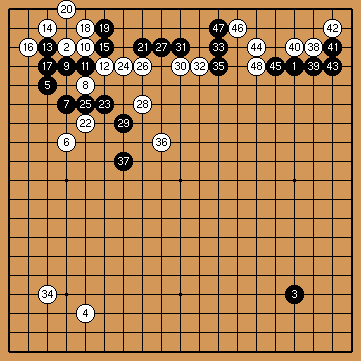
| Event |
26th WAGC, round 6 |
|---|
| Date |
2005 May 26 |
|---|
| Place |
Nagoya, Japan |
|---|
| Black |
Ralph Spiegl, Austria |
|---|
| White |
Leon Matoh, Slovenia |
|---|
| Commentary |
Pieter Mioch, 6d |
|---|
| Game record |
|
|---|
Figure 1: 1-48
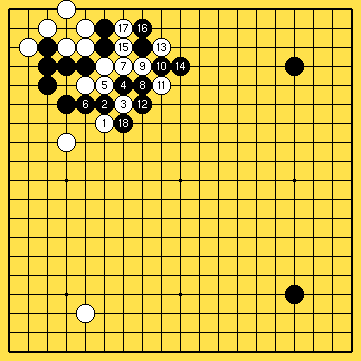
Diagram 1
By lack of professional help I had a look had my old super joseki dics
and this is what they came up with. It looks like white 1, diagram 1 and
not game move white 22 is the way to go here. The answer is funny enough
the same move as in the game, attaching at 2. The result of black's
tesuji (2) followed by the sacrifice strategy is felt to be ok for
black. Black has a thick position and doesn't mind the amount of cash
white got so much.
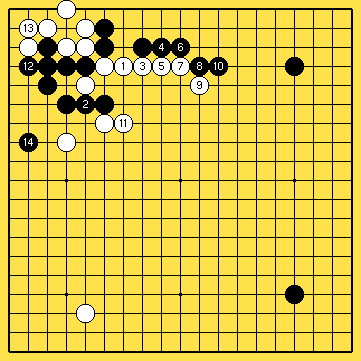
Diagram 2
To thwart blacks plan white can see what happens if he answers at 1 in
diagram 2. According to the dics both players can live with this result.
Pushing from black 33 does not feel that good. Starting to move from
black 29 is more natural since those stones cannot be considered strong
yet and the black top stones are solid.
Instead of entering at the 3-3 point (38) an extension to D11 would
make the game easier for white. One cannot help
but feel that after the invasion white got rather busy in this game.
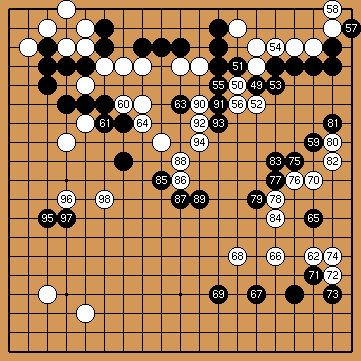
Figure 2: 49-98
Sacrificing stones 50-52-56 is a success for white since he got two
living groups in return. Both these groups, especially the one on the
right side, also secured points which makes the loss of said three
stones not at all painful. All in all, because of the fuseki black is
still doing fine and could have delivered a forceful punch if he had
played black 95 on the forth row instead of the third.
White suddenly seems to be able to exploit black's thinness a little
which gives him the chance to come back in the game again. In the end,
however, a fierce ko-battle decided the game in Black's (Ralph Spiegl)
favor.
| 





